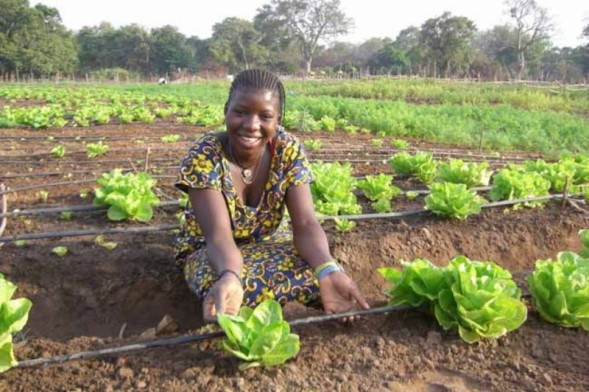Solar Electric Light Fund Commitment at United Nations Private Sector Forum to Expand Energy Access to World's Rural Poor
Published 09-20-11
Submitted by Solar Electric Light Fund

The Solar Electric Light Fund (SELF), a Washington, DC-based nonprofit working to eliminate energy poverty through the use of solar power, today made a commitment to the United Nations Sustainable Energy for All initiative to scale-up its "Whole Village" development model, an integrated approach to implementing solar energy systems that empower rural communities in developing countries to improve their health, education, economic development, and food and water security. SELF will be joining international leaders at the United Nations Private Sector Forum on September 20 to discuss how access to energy can be realized for the 1.6 billion people who live in energy poverty.
As part of its Whole Village pilot project, SELF installed three Solar Market Gardens™ (SMG), an innovative, unique solar-powered drip irrigation system for women farming collectives in Dunkassa and Bessassi, two villages in the Kalalé district of northern Benin in West Africa. A two-year study conducted by Stanford University’s Program on Food Security and the Environment and published in the Proceedings of the National Academy of Sciences in 2010, found that SELF’s SMG model "significantly augments both household income and nutritional intake, particularly during the dry season, and is cost effective compared to alternative technologies."
Such successful results have paved the way for SELF to expand its model by installing eight new SMGs in other villages and additional solar energy systems to power water wells, schools, health clinics, a microenterprise center, an Internet kiosk, and lighting facilities in Dunkassa and Bessassi.
“We believe that energy is a human right and that access to it is essential to achieving the Millennium Development Goals,” said Bob Freling, Executive Director of SELF. “Our commitment seeks to both validate the Whole Village model’s value and demonstrate that it can be used throughout the developing world to alleviate poverty through the use of solar energy. We invite the public and private sectors to join us with the global expansion and replication of this model so that 1.6 billion people can lift themselves out of energy poverty.”
In addition to its work in Benin, SELF’s other solar energy projects include the electrification of multiple health clinics in Rwanda and Lesotho, the Kisaruni Girls School in Kenya, and the Rebuilding Haiti Initiative, a partnership with Partners In Health that aims to provide solar power to health facilities throughout Haiti.
About SELF
The Solar Electric Light Fund (SELF) is a Washington, DC-based nonprofit working to eliminate energy poverty and combat climate change by bringing solar power and wireless Internet access to remote rural villages in the developing world. SELF has pioneered innovative applications of solar power for drip irrigation in Benin, telemedicine in the Amazon rainforest, vaccine refrigeration in Rwanda, online learning in South Africa, and microenterprise development in Nigeria. These successful pilot projects culminated in SELF’s whole-village approach, or Solar Integrated Development model. Since 1990, SELF has completed projects in 20 countries, making it a leader among non-governmental organizations in realizing practical and cost-effective alternative energy solutions for rural villagers. For more information, please visit www.self.org.
Solar Electric Light Fund
Solar Electric Light Fund
The Solar Electric Light Fund (SELF) is a Washington, DC based nonprofit working to eliminate energy poverty by using solar power in developing countries to assist in economic, education, health and agricultural development. SELF has pioneered innovative applications of solar power for drip irrigation, health care services, online distance learning, and micro-enterprise development. Since 1990, SELF has completed projects in 20 countries, making it a leader among non-governmental organizations implementing practical, cost-effective solar power solutions in the field. For more information, please visit www.self.org.
More from Solar Electric Light Fund

